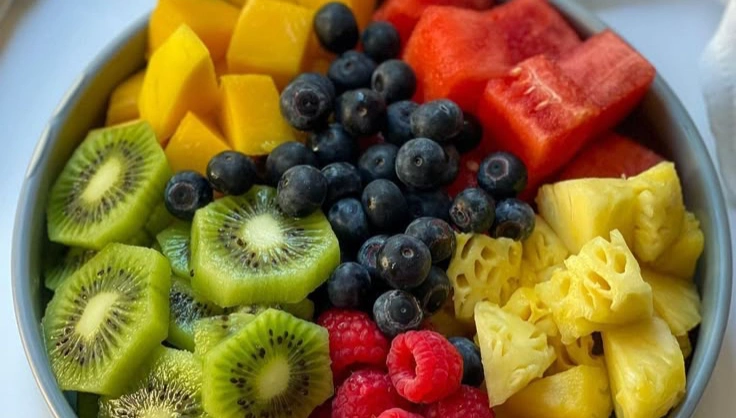Fruits and Health: How They Affect the Body and Digestion
Fruits are not just a tasty addition to your diet — they are a powerful source of vitamins, minerals, fiber, and antioxidants. Eating a variety of fruits regularly has a positive impact on overall health, especially digestion.
1. Improved digestion
Fruits are rich in dietary fiber, both soluble and insoluble. Fiber promotes healthy bowel movements, improves intestinal motility, and helps prevent constipation. Apples, pears, plums, figs, and berries are especially effective for digestive health.
2. Gut microbiome support
Some fruits contain natural prebiotics — substances that nourish beneficial gut bacteria. Bananas, apples, and berries help grow healthy gut flora, supporting immunity and nutrient absorption.
3. Anti-inflammatory and antioxidant effects
Citrus fruits, pomegranates, kiwis, grapes, and blueberries are rich in antioxidants, which reduce inflammation and protect cells from damage. This supports not only digestion, but also cardiovascular and neurological health.
4. Natural enzyme aid
Fruits like pineapple and papaya contain digestive enzymes (bromelain and papain) that help break down proteins and make food easier to digest, especially heavy meals.
5. Hydration and lightness
Many fruits — such as watermelon, melon, oranges, and strawberries — are high in water content, helping maintain hydration and promoting smoother digestion.
Incorporating a variety of fruits into your daily meals can boost energy, strengthen immunity, and improve digestive comfort. The key is balance: fruits are best consumed in moderation, ideally in the morning or between meals for maximum benefit.


1. Rich in Dietary Fiber: Fuel for Healthy Digestion
One of the most important benefits of fruits is their high dietary fiber content, including both soluble and insoluble fiber. Soluble fiber (found in apples, citrus fruits, and berries) forms a gel-like substance in the gut, helping to regulate blood sugar levels and cholesterol. Insoluble fiber (present in the skins of pears, plums, and figs) adds bulk to stool and promotes regular bowel movements, easing constipation and supporting a healthy colon. Fiber also improves intestinal motility and can help relieve bloating.
2. Gut Microbiome Support: Nourishing Good Bacteria
A healthy digestive system relies on a balanced gut microbiome — the community of trillions of bacteria living in your intestines. Some fruits are rich in natural prebiotics, substances that feed and support beneficial gut bacteria. Bananas, apples (especially with the skin), and berries are particularly effective in promoting a thriving gut environment. A strong microbiome plays a vital role in immunity, mood regulation, nutrient absorption, and even brain health.
3. Anti-inflammatory and Antioxidant Power
Modern lifestyles often expose our bodies to inflammation and oxidative stress — both of which can damage the gut lining and interfere with digestion. Fruits like blueberries, pomegranates, citrus fruits, grapes, and kiwi are rich in antioxidants such as vitamin C, flavonoids, and polyphenols, which protect gut tissues from inflammation and cellular damage. These fruits also support cardiovascular, skin, and neurological health.
4. Natural Digestive Enzymes
Some fruits contain natural enzymes that assist with digestion, particularly of proteins. Pineapple contains bromelain, and papaya offers papain — both help break down tough protein structures and aid in digesting heavy or protein-rich meals. Including these enzyme-rich fruits in your diet can help ease bloating, gas, and discomfort after meals, especially when eaten fresh.
5. Hydration and Lightness
Fruits with high water content contribute to overall hydration, which is essential for smooth digestion and nutrient transport. Watermelon, cantaloupe, oranges, strawberries, and grapes help keep the digestive tract lubricated and support healthy stool consistency. These fruits are especially beneficial during warm seasons or after intense physical activity, when dehydration can slow digestion and lead to constipation.
✅ Tips for Getting the Most Out of Fruits
- Eat a variety: Different fruits provide different nutrients. Rotate seasonal fruits to maximize health benefits.
- Consume them raw and whole: Whole fruits contain more fiber and nutrients than juices or dried forms.
- Pair wisely: Fruits are generally best eaten on their own or with light meals for optimal digestion.
- Mind timing: Many people find that eating fruits in the morning or between meals supports better digestion and avoids fermentation or bloating.
- Watch portion sizes: Though fruits are healthy, moderation is key — especially with high-sugar varieties like mangoes or grapes.
Close